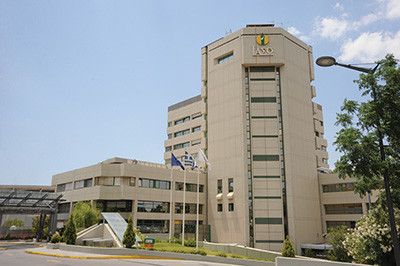
Gregory Xepapadakis
Breast Surgeon - Director of the 2nd Breast Clinic of Iaso Hospital
ABOUT DOCTOR
Dr. Grigoris Xepapadakis is a breast surgeon, Director of the 2nd Breast Clinic of Iaso Hospital and Founder of the E.M.E.I.S. (Scientific Mammological Society Treatment Support).
CONTACT US
Tel. +30 210 69 14 468, +30 210 63 83 721-722
Email: gxepapadakis@iaso.gr
E.M.E.I.S.
E.M.E.I.S. (Scientific Mammological Society of Healing - Support) was founded by Grigoris Xepapadakis in order to:
Provide support to women with breast cancer who are uninsured and have a serious financial problem.
To support young scientists in their education and in the cognitive subject of breast cancer, covering the costs of participation in scientific events.
To inform the women of the region and raise their awareness with the excursion checks that they perform completely free of charge throughout the country.
The whole team of Mr. Xepapadakis is volunteer doctors and members of E.M.E.I.S.
Learn more about E.M.E.I.S. work at https://www.emeis.com.gr
DOCTORS
Panagiota Dasiou, Surgeon M.D
Nagia Kontogianni, Surgeon M.D
Romina Alevizou, Surgeon M.D
Dimitris Nasikas, Surgeon M.D
Lazaros Papadopoulos, Surgeon M.D
Dimitris Maniatis, Surgeon M.D
Sofia Filippidou, Surgeon M.D
Stavros Paraskevopoulos, Plastic surgeon M.D
Fani Zarbala, Anesthetist M.D
Ioannis Kehagioglou, Anesthetist M.D
Dionysios Koufoudakis, Surgeon (Mammotome)
Florentia Fostira, Clinical Laboratory Geneticist ErCLG & Genetic Counsellor MSc
Stavroula Eleftheriadou, Surgeon M.D
Gionida Selmani, Surgeon M.D, PhD. Candidate
PSYCHOLOGISTS
Iliana Goula
Maria Vougiouklaki
Panagiota Dasiou, Surgeon M.D
Nagia Kontogianni, Surgeon M.D
Romina Alevizou, Surgeon M.D
Dimitris Nasikas, Surgeon M.D
Lazaros Papadopoulos, Surgeon M.D
Dimitris Maniatis, Surgeon M.D
Sofia Filippidou, Surgeon M.D
Stavros Paraskevopoulos, Plastic surgeon M.D
Fani Zarbala, Anesthetist M.D
Ioannis Kehagioglou, Anesthetist M.D
Dionysios Koufoudakis, Surgeon (Mammotome)
Florentia Fostira, Clinical Laboratory Geneticist ErCLG & Genetic Counsellor MSc
Stavroula Eleftheriadou, Surgeon M.D
Gionida Selmani, Surgeon M.D, PhD. Candidate
PSYCHOLOGISTS
Iliana Goula
Maria Vougiouklaki
Nagia Kontogianni, Surgeon M.D
Romina Alevizou, Surgeon M.D
Dimitris Nasikas, Surgeon M.D
Lazaros Papadopoulos, Surgeon M.D
Dimitris Maniatis, Surgeon M.D
Sofia Filippidou, Surgeon M.D
Stavros Paraskevopoulos, Plastic surgeon M.D
Fani Zarbala, Anesthetist M.D
Ioannis Kehagioglou, Anesthetist M.D
Dionysios Koufoudakis, Surgeon (Mammotome)
Florentia Fostira, Clinical Laboratory Geneticist ErCLG & Genetic Counsellor MSc
Stavroula Eleftheriadou, Surgeon M.D
Gionida Selmani, Surgeon M.D, PhD. Candidate
PSYCHOLOGISTS
Iliana Goula
Maria Vougiouklaki
Romina Alevizou, Surgeon M.D
Dimitris Nasikas, Surgeon M.D
Lazaros Papadopoulos, Surgeon M.D
Dimitris Maniatis, Surgeon M.D
Sofia Filippidou, Surgeon M.D
Stavros Paraskevopoulos, Plastic surgeon M.D
Fani Zarbala, Anesthetist M.D
Ioannis Kehagioglou, Anesthetist M.D
Dionysios Koufoudakis, Surgeon (Mammotome)
Florentia Fostira, Clinical Laboratory Geneticist ErCLG & Genetic Counsellor MSc
Stavroula Eleftheriadou, Surgeon M.D
Gionida Selmani, Surgeon M.D, PhD. Candidate
PSYCHOLOGISTS
Iliana Goula
Maria Vougiouklaki
Dimitris Nasikas, Surgeon M.D
Lazaros Papadopoulos, Surgeon M.D
Dimitris Maniatis, Surgeon M.D
Sofia Filippidou, Surgeon M.D
Stavros Paraskevopoulos, Plastic surgeon M.D
Fani Zarbala, Anesthetist M.D
Ioannis Kehagioglou, Anesthetist M.D
Dionysios Koufoudakis, Surgeon (Mammotome)
Florentia Fostira, Clinical Laboratory Geneticist ErCLG & Genetic Counsellor MSc
Stavroula Eleftheriadou, Surgeon M.D
Gionida Selmani, Surgeon M.D, PhD. Candidate
PSYCHOLOGISTS
Iliana Goula
Maria Vougiouklaki
Lazaros Papadopoulos, Surgeon M.D
Dimitris Maniatis, Surgeon M.D
Sofia Filippidou, Surgeon M.D
Stavros Paraskevopoulos, Plastic surgeon M.D
Fani Zarbala, Anesthetist M.D
Ioannis Kehagioglou, Anesthetist M.D
Dionysios Koufoudakis, Surgeon (Mammotome)
Florentia Fostira, Clinical Laboratory Geneticist ErCLG & Genetic Counsellor MSc
Stavroula Eleftheriadou, Surgeon M.D
Gionida Selmani, Surgeon M.D, PhD. Candidate
PSYCHOLOGISTS
Iliana Goula
Maria Vougiouklaki
Dimitris Maniatis, Surgeon M.D
Sofia Filippidou, Surgeon M.D
Stavros Paraskevopoulos, Plastic surgeon M.D
Fani Zarbala, Anesthetist M.D
Ioannis Kehagioglou, Anesthetist M.D
Dionysios Koufoudakis, Surgeon (Mammotome)
Florentia Fostira, Clinical Laboratory Geneticist ErCLG & Genetic Counsellor MSc
Stavroula Eleftheriadou, Surgeon M.D
Gionida Selmani, Surgeon M.D, PhD. Candidate
PSYCHOLOGISTS
Iliana Goula
Maria Vougiouklaki
Sofia Filippidou, Surgeon M.D
Stavros Paraskevopoulos, Plastic surgeon M.D
Fani Zarbala, Anesthetist M.D
Ioannis Kehagioglou, Anesthetist M.D
Dionysios Koufoudakis, Surgeon (Mammotome)
Florentia Fostira, Clinical Laboratory Geneticist ErCLG & Genetic Counsellor MSc
Stavroula Eleftheriadou, Surgeon M.D
Gionida Selmani, Surgeon M.D, PhD. Candidate
PSYCHOLOGISTS
Iliana Goula
Maria Vougiouklaki
Stavros Paraskevopoulos, Plastic surgeon M.D
Fani Zarbala, Anesthetist M.D
Ioannis Kehagioglou, Anesthetist M.D
Dionysios Koufoudakis, Surgeon (Mammotome)
Florentia Fostira, Clinical Laboratory Geneticist ErCLG & Genetic Counsellor MSc
Stavroula Eleftheriadou, Surgeon M.D
Gionida Selmani, Surgeon M.D, PhD. Candidate
PSYCHOLOGISTS
Iliana Goula
Maria Vougiouklaki
Fani Zarbala, Anesthetist M.D
Ioannis Kehagioglou, Anesthetist M.D
Dionysios Koufoudakis, Surgeon (Mammotome)
Florentia Fostira, Clinical Laboratory Geneticist ErCLG & Genetic Counsellor MSc
Stavroula Eleftheriadou, Surgeon M.D
Gionida Selmani, Surgeon M.D, PhD. Candidate
PSYCHOLOGISTS
Iliana Goula
Maria Vougiouklaki
Ioannis Kehagioglou, Anesthetist M.D
Dionysios Koufoudakis, Surgeon (Mammotome)
Florentia Fostira, Clinical Laboratory Geneticist ErCLG & Genetic Counsellor MSc
Stavroula Eleftheriadou, Surgeon M.D
Gionida Selmani, Surgeon M.D, PhD. Candidate
PSYCHOLOGISTS
Iliana Goula
Maria Vougiouklaki
Dionysios Koufoudakis, Surgeon (Mammotome)
Florentia Fostira, Clinical Laboratory Geneticist ErCLG & Genetic Counsellor MSc
Stavroula Eleftheriadou, Surgeon M.D
Gionida Selmani, Surgeon M.D, PhD. Candidate
PSYCHOLOGISTS
Iliana Goula
Maria Vougiouklaki
Florentia Fostira, Clinical Laboratory Geneticist ErCLG & Genetic Counsellor MSc
Stavroula Eleftheriadou, Surgeon M.D
Gionida Selmani, Surgeon M.D, PhD. Candidate
PSYCHOLOGISTS
Iliana Goula
Maria Vougiouklaki
Stavroula Eleftheriadou, Surgeon M.D
Gionida Selmani, Surgeon M.D, PhD. Candidate
PSYCHOLOGISTS
Iliana Goula
Maria Vougiouklaki
Gionida Selmani, Surgeon M.D, PhD. Candidate
PSYCHOLOGISTS
Iliana Goula
Maria Vougiouklaki
PSYCHOLOGISTS
Iliana Goula
Maria Vougiouklaki
Iliana Goula
Maria Vougiouklaki
Maria Vougiouklaki
INFORMATION DESK BREAST CLINIC
Katerina Chyta
Efi Aggeli
Maria Vidalis
Rena Pagonis
Depi Poulakou
Eirini Stathopoulou
Katia Tzanidakis
Irene Tagaroulia
Sofia Pembetzoglou
Sofia Adamopoulou
THIRD PART ASSOCIATES
Dimitris Panousis, Gynecologist
Manos Pavlakis, Surgeon
Dimitris Koronarchis, Surgeon
DPO MANAGEMENT
George Gozadinos, DPO Manager
GENERAL MANAGEMENT
Malou Xepapadaki, HR Manager
Katerina Chyta
Efi Aggeli
Maria Vidalis
Rena Pagonis
Depi Poulakou
Eirini Stathopoulou
Katia Tzanidakis
Irene Tagaroulia
Sofia Pembetzoglou
Sofia Adamopoulou
THIRD PART ASSOCIATES
Dimitris Panousis, Gynecologist
Manos Pavlakis, Surgeon
Dimitris Koronarchis, Surgeon
DPO MANAGEMENT
George Gozadinos, DPO Manager
GENERAL MANAGEMENT
Malou Xepapadaki, HR Manager
Efi Aggeli
Maria Vidalis
Rena Pagonis
Depi Poulakou
Eirini Stathopoulou
Katia Tzanidakis
Irene Tagaroulia
Sofia Pembetzoglou
Sofia Adamopoulou
THIRD PART ASSOCIATES
Dimitris Panousis, Gynecologist
Manos Pavlakis, Surgeon
Dimitris Koronarchis, Surgeon
DPO MANAGEMENT
George Gozadinos, DPO Manager
GENERAL MANAGEMENT
Malou Xepapadaki, HR Manager
Maria Vidalis
Rena Pagonis
Depi Poulakou
Eirini Stathopoulou
Katia Tzanidakis
Irene Tagaroulia
Sofia Pembetzoglou
Sofia Adamopoulou
THIRD PART ASSOCIATES
Dimitris Panousis, Gynecologist
Manos Pavlakis, Surgeon
Dimitris Koronarchis, Surgeon
DPO MANAGEMENT
George Gozadinos, DPO Manager
GENERAL MANAGEMENT
Malou Xepapadaki, HR Manager
Rena Pagonis
Depi Poulakou
Eirini Stathopoulou
Katia Tzanidakis
Irene Tagaroulia
Sofia Pembetzoglou
Sofia Adamopoulou
THIRD PART ASSOCIATES
Dimitris Panousis, Gynecologist
Manos Pavlakis, Surgeon
Dimitris Koronarchis, Surgeon
DPO MANAGEMENT
George Gozadinos, DPO Manager
GENERAL MANAGEMENT
Malou Xepapadaki, HR Manager
Depi Poulakou
Eirini Stathopoulou
Katia Tzanidakis
Irene Tagaroulia
Sofia Pembetzoglou
Sofia Adamopoulou
THIRD PART ASSOCIATES
Dimitris Panousis, Gynecologist
Manos Pavlakis, Surgeon
Dimitris Koronarchis, Surgeon
DPO MANAGEMENT
George Gozadinos, DPO Manager
GENERAL MANAGEMENT
Malou Xepapadaki, HR Manager
Eirini Stathopoulou
Katia Tzanidakis
Irene Tagaroulia
Sofia Pembetzoglou
Sofia Adamopoulou
THIRD PART ASSOCIATES
Dimitris Panousis, Gynecologist
Manos Pavlakis, Surgeon
Dimitris Koronarchis, Surgeon
DPO MANAGEMENT
George Gozadinos, DPO Manager
GENERAL MANAGEMENT
Malou Xepapadaki, HR Manager
Katia Tzanidakis
Irene Tagaroulia
Sofia Pembetzoglou
Sofia Adamopoulou
THIRD PART ASSOCIATES
Dimitris Panousis, Gynecologist
Manos Pavlakis, Surgeon
Dimitris Koronarchis, Surgeon
DPO MANAGEMENT
George Gozadinos, DPO Manager
GENERAL MANAGEMENT
Malou Xepapadaki, HR Manager
Irene Tagaroulia
Sofia Pembetzoglou
Sofia Adamopoulou
THIRD PART ASSOCIATES
Dimitris Panousis, Gynecologist
Manos Pavlakis, Surgeon
Dimitris Koronarchis, Surgeon
DPO MANAGEMENT
George Gozadinos, DPO Manager
GENERAL MANAGEMENT
Malou Xepapadaki, HR Manager
Sofia Pembetzoglou
Sofia Adamopoulou
THIRD PART ASSOCIATES
Dimitris Panousis, Gynecologist
Manos Pavlakis, Surgeon
Dimitris Koronarchis, Surgeon
DPO MANAGEMENT
George Gozadinos, DPO Manager
GENERAL MANAGEMENT
Malou Xepapadaki, HR Manager
Sofia Adamopoulou
THIRD PART ASSOCIATES
Dimitris Panousis, Gynecologist
Manos Pavlakis, Surgeon
Dimitris Koronarchis, Surgeon
DPO MANAGEMENT
George Gozadinos, DPO Manager
GENERAL MANAGEMENT
Malou Xepapadaki, HR Manager
THIRD PART ASSOCIATES
Dimitris Panousis, Gynecologist
Manos Pavlakis, Surgeon
Dimitris Koronarchis, Surgeon
DPO MANAGEMENT
George Gozadinos, DPO Manager
GENERAL MANAGEMENT
Malou Xepapadaki, HR Manager
Dimitris Panousis, Gynecologist
Manos Pavlakis, Surgeon
Dimitris Koronarchis, Surgeon
DPO MANAGEMENT
George Gozadinos, DPO Manager
GENERAL MANAGEMENT
Malou Xepapadaki, HR Manager
Manos Pavlakis, Surgeon
Dimitris Koronarchis, Surgeon
DPO MANAGEMENT
George Gozadinos, DPO Manager
GENERAL MANAGEMENT
Malou Xepapadaki, HR Manager
Dimitris Koronarchis, Surgeon
DPO MANAGEMENT
George Gozadinos, DPO Manager
GENERAL MANAGEMENT
Malou Xepapadaki, HR Manager
DPO MANAGEMENT
George Gozadinos, DPO Manager
GENERAL MANAGEMENT
Malou Xepapadaki, HR Manager


CONTACT INFORMATIONS
IASO, GENERAL MATERNITY & GYNECOLOGY CLINIC
37-39 KIFISIAS AVE, MAROUSI ATHENS 151 23
Tel: +30 210 63 83 721 - 722, +30 210 61 84 851
File services tel: +30 210 6383720, +30 210 6184853
Email: gxepapadakis@iaso.gr Fax: +30 210 6184852
IASO, GENERAL MATERNITY & GYNECOLOGY CLINIC
37-39 KIFISIAS AVE, MAROUSI ATHENS 151 23
Tel: +30 210 63 83 721 - 722, +30 210 61 84 851
File services tel: +30 210 6383720, +30 210 6184853
Email: gxepapadakis@iaso.gr Fax: +30 210 6184852
37-39 KIFISIAS AVE, MAROUSI ATHENS 151 23
Tel: +30 210 63 83 721 - 722, +30 210 61 84 851
File services tel: +30 210 6383720, +30 210 6184853
Email: gxepapadakis@iaso.gr Fax: +30 210 6184852
Tel: +30 210 63 83 721 - 722, +30 210 61 84 851
File services tel: +30 210 6383720, +30 210 6184853
Email: gxepapadakis@iaso.gr Fax: +30 210 6184852
File services tel: +30 210 6383720, +30 210 6184853
Email: gxepapadakis@iaso.gr Fax: +30 210 6184852
Email: gxepapadakis@iaso.gr Fax: +30 210 6184852
SCIENTIFIC WORK OF Dr. XEPAPADAKI’S TEAM
The principles of the world literature will be followed in order to produce studies that can be published (listed below).
This method is a continuation and evolution of the innovative Mammotome method of Johnson & Johnson's.
The equipment of this modern technology enables us to perform a breast biopsy without surgical intervention.
After approximately one year our clinic will be certified as a Panhellenic Training Center for the Sentinel Lymph Node.
The seminar, which is internationally accepted, will give IASO a scientific lead.
Our efforts have been successful and IBUS has established our department as one of its 2 permanent annual destinations.
CHARITY SOCIAL WORK
The aim of the speeches is to inform and alert women about breast disorders.
If you are interested in organizing such an event, please contact us at gxepapadakis@gmail.com
RESEARCH STUDIES ONGOING
ii. Percentage of sentinel lymph node credibility (can be published in a Greek magazine)
iii. Infusion methods: comparison of methods (can be published in a Greek magazine)
iv. Sentinel lymph node in non-palpable lesions (can be published in a foreign magazine)
ANNOUNCEMENTS IN GREEK AND INTERNATIONAL CONFERENCES
P.Nassiou1, D. Koufoudakis1, D.Panousis1, D.Koronarchis1, G.Papazoglou1, E.Patsea2, D.Grosomanidis1, Gr.Xepapadakis1
1. Breast Clinic, IASO General, Athens
2.Pathologic and Anatomic Department, IASO General, Athens
PURPOSE
Conservative Breast Conservation Treatments (BCT) were established as an alternative surgical treatment of early stage breast cancer in the 1980s and 1990s, when seven randomized studies reported similar survival rates between modified radical mastectomy (TPM) and BCT with radiotherapy (RT) .
Since then, numerous studies have been undertaken to determine the rates of local relapse and survival, and thus to study the safety of the method as well as the risk factors in order to obtain an increase in overall survival.
MATERIAL AND METHOD
In this retrospective study, we analyzed the data from 316 women submitted to BCT in our section during the 1996-2006 period and that were subsequently followed for 2-13 years (average 7.05 years) for local relapse and distant metastases.
Of these women, 281 had invasive adenocarcinoma, 30 DCIS, 3 LCIS, 1 N. Paget, and 1 malignant follicular tumor.
273 of the 316 women were submitted to a radiotherapy (RT) after the surgical intervention.
RESULTS
Of the 316 patients, 11 (3.48%) showed a local relapse, 7 (2.21%) unilateral breast cancer and 5 (1.5%) metastatic disease – three of them died. Four patients died from other causes (ovarian Ca, pulmonary embolism, ischemic colitis, age), while two had other problems (Ca in colon, Ca in lungs).
There were 7 local relapses (2.75%) in 254 patients that underwent a RT, while in 62 patients without RT, 4 local relapses (6.45%) occurred.
All patients had free surgical limits.
The relapse-free interval was 8.09 years, while the disease-free interval was 8.45 years. In the group of patients with local relapse, mortality is nil.
CONCLUSIONS
Conservative breast cancer surgery is a safe method and is even safer when the entire therapeutic protocol is followed, particularly radiotherapy.
A careful and multifactorial choice of patients is critical to the successful outcome of the BCT.
Immunocytochemical Expression of EZH2, PAXILLIN & KI-67 in Breast Carcinomas: Correlation with prognostic markers
1 IASO General Hospital, Department of Breast Surgery, Athens, Greece
2 Medical School, University of Athens, 1st Pathology Dpt, Cytology Unit, Athens, Greece
3 IASO General Hospital, Department of Cytology, Athens, Greece
4 IASO General Hospital, Department of Pathology, Athens, Greece
5 Medical School, University of Athens, Department of Pathology, Athens
12th Biennial Meeting of the International Gynecologic Cancer Society-Bangkok, Thailand October 25-28, 2008
Few biomarkers of breast cancer progression have been proven to be clinically useful. Therefore, new prognostic factors more precise and reliable are needed.
The polycamb group protein EZH2 was found to be predictive of poor outcome of patients with invasive breast carcinomas. Paxillin, a cyto-skeletal local adhesion protein has been correlated with a more aggressive clinical outcome. Furthermore, overexpression of proliferating marker Ki-67 has been identified in many malignancies including breast carcinomas.
The aim of this preliminary study was to investigate EZH-2, paxillin and Ki-67 expression in imprints of breast carcinomas and their correlation with classical clinicopathological prognostic factors.
Fifty imprint smears of breast carcinomas were studied immunocytochemically with the use of EZH2, paxillin and Ki-67 antibodies. The results were correlated with classical prognostic factors.
Overexpression of EZH2 was observed in 78% of breast carcinomas and was strongly associated with standard pathology predictors of clinical outcome including tumor size (p=0.003), stage (p< 0.0001) negative ER/PR status (p< 0.001) and positive lymph nodes status (p< 0.001) but not HER2 protein expression. EZH2 overexpression was also correlated with high Ki-67 expression. Paxillin immunoreactivity was observed in 32% of breast carcinomas and was in relationship with HER2 overexpression (p< 0.001). No correlation was found between paxillin expression and ER/PR status, stage, lymph nodes metastasis and tumor size.
Conclusions: EZH2 in correlation with Ki-67 as well as Paxillin expression in combination with HER2 positive expression could be both markers of significant interest for targeted therapy in patients with breast carcinomas.
Topoisomerase II Alpha & Paxillin Expression as markers of aggresive breast cancer: Correlation with clinicopathological parameters
D.P. Panousis1, V. Kyriakidou2, E. Patsouris2, D. Koronarchis1, P. Dasiou1, D. Koufoudakis1, G. Xepapadakis1, P. Athanassiadou2, E. Katsamangkou1
1 Cholargos-Athens/GR
2 Athens/GR
Progression of breast cancer is a significant clinical problem and there is a need for novel treatment strategies. Few biomarkers of breast cancer progression have been proven to be clinically useful, so the consensus remains that new prognostic factors which are more precise and reliable are needed. Topo IIα is a nuclear enzyme that plays a key role in DNA replication. Increased Topo IIα expression is a strong predictor of unfavorable outcome.
Paxillin is an adhesion protein of tyrosine oncokinase family and its expression has been also correlated with most aggressive and highly proliferative breast neoplasms. The aim of this study was to compare the expression of Topo IIα and paxillin with clinicopathological parameters. We studied 60 imprints smears of breast carcinomas immunocytochemically with the use of paxillin and Topo IIα antibodies.
The results weere correlated with Ki-67, ER/PR status, c-erb-B2 and classical pathological markers. Topo IIα (61.6%) and paxillin (56.6%) increased expression on univariate analysis was correlated with advanced tumor stage (p<0.001), lymphnode metastasis (only for Topo IIα) and tumor grade as well as with c-erb-B2 and ki-67 expression (p<0.0001). No correlation was found between paxillin and Topo IIα expression and ER/PR status, tumor size and lymphnode metastasis (only for paxillin).
In conclusion our study has shown significant correlation of increased Topo IIα and paxillin expression with aggressive variables of breast cancer. Additionally the fact that Topo IIα and paxillin showed tight correlations in their expressions, suggests that their association should be further studied as possible predictive factors for targeted therapy in breast cancers.
EBCC 7, 24-27 March Barcelona 2010
Prediction of breast cancer progression is still a clinical problem of major concern. During the last years biomarkers has been used for the assignment of the biological behavior of breast tumors but only few of them have been proven to be clinically useful. Therefore, new prognostic factors more precise and reliable are needed and new strategies should be considered.
The polycomb group protein enhancer of zeste homologue (EZH2) has been reported as an aggressive breast cancer marker. Its expression was further associated with tumor size, hormone receptor status and advanced stage of the disease.
The aim of this study was to investigate the value of the expression of EZH2 in relationship with DNA ploidy in order to predict the potential role of the above markers in tumor aggressiveness.
We studied 62 imprints of breast carcinomas immunocytochemically with the use of EZH2 antibody. DNA ploidy was measured with Image Plus Software on imprint smears with the Thionin Feulgen procedure in order to be used for image analysis.The prevalence of EZH2 expression and DNA ploidy was then correlated with clinicopathological parameters.
Topoisomerase II Alpha & Paxillin Expression as markers of aggresive breast cancer: Correlation with clinicopathological parameters
1 Cholargos-Athens/GR
2 Athens/GR
Introduction: Progression of breast cancer is a significant clinical problem and there is a need for novel treatment strategies. Few biomarkers of breast cancer progression have been proven to be clinically useful, so the consensus remains that new prognostic factors which are more precise and reliable are needed. Topo IIα is a nuclear enzyme that plays a key role in DNA replication. Increased Topo IIα expression is a strong predictor of unfavorable outcome. Paxillin is an adhesion protein of tyrosine oncokinase family and its expression has been also correlated with most aggressive and highly proliferative breast neoplasms. The aim of this study was to compare the expression of Topo IIα and paxillin with clinicopathological parameters.
Material and methods:We studied 60 imprints smears of breast carcinomas immunocytochemically with the use of paxillin and Topo IIα antibodies. The results weere correlated with Ki-67, ER/PR status, c-erb-B2 and classical pathological markers.
Results:Topo IIα (61.6%) and paxillin (56.6%) increased expression on univariate analysis was correlated with advanced tumor stage (p<0.001), lymphnode metastasis (only for Topo IIα) and tumor grade as well as with c-erb-B2 and ki-67 expression (p<0.0001). No correlation was found between paxillin and Topo IIα expression and ER/PR status, tumor size and lymphnode metastasis (only for paxillin).
Conclusion:In conclusion our study has shown significant correlation of increased Topo IIα and paxillin expression with aggressive variables of breast cancer. Additionally the fact that Topo IIα and paxillin showed tight correlations in their expressions, suggests that their association should be further studied as possible predictive factors for targeted therapy in breast cancers.









